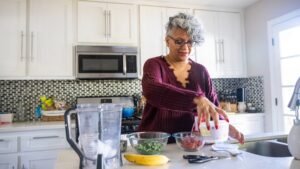
Have you:
- Been dieting for decades?
- Felt like you know exactly what to eat?
- Become exhausted by the constant chatter of food police in your mind?
And yet you struggle to make consistently healthy choices?
Whether your end goal is to lose weight, do everything in your power to prevent or treat a disease, or both, the anxiety of feeling stuck in patterns that don’t align with your values around health can be overwhelming.
Why Decades of Dieting Lead to Food Obsession (Spoiler Alert: It’s Not Your Fault)
The typical solution to eating struggles or weight gain is All or Nothing Dieting. Where you feel you either have to eat “perfectly” or “what’s the point?”
This leads to a cycle of being “on” a diet or “off” a diet over the span of decades.
It probably won’t surprise you to hear All or Nothing Dieting doesn’t work: experts estimate that 80-98% of diets fail!
Additionally, All or Nothing Dieting:
- Disconnects you from your emotional needs as you learn that food works to numb your feelings when you slide back to old habits. As a result, you rely on emotional eating whenever physical or emotional needs arise.
- Tells you that it’s your fault when the diet doesn’t work and shames you for weight regain.
- Turns on the food police, labeling some foods as “bad” and others as “good.” Biologically, your brain responds by creating motivational brain chemicals that make you crave the “bad” food even more.
In the end, the biggest harm of all: All or Nothing Dieting causes you to stop trusting yourself.
You end up trying in vain to stay away from carbs or sugar, or whatever your food of choice is because you can’t trust yourself to be around it. You wonder why a smart, capable woman like yourself can’t figure out food.
Now you know… it’s not your fault.
Two Steps to Stop Obsessing About Food and Make Consistent Healthy Choices
You can create a supportive relationship with food, your body and your health so you can eat with joy instead of eating to seek joy by cultivating the Courage to Trust.
The Courage to Trust allows you to unhook from All or Nothing Dieting and create consistently healthy choices because you know:
- Food isn’t the problem (and neither are you).
- You can hear and respond to the cues your body is giving you, instead of eating to numb or restricting for control.
- You can mindfully indulge AND consistently make nourishing choices.
- You are worthy of care and love, just as you are, even while pursuing weight loss.
There are 2 steps you can take right now to begin cultivating the Courage to Trust in your life:
Step #1: Heal the All or Nothing Mindset Caused by All or Nothing Dieting
All or Nothing Dieting says you are a failure if you fall short of “perfect” eating or body type. This black and white or perfectionist mindset will leave you feeling like a failure 99-100% of the time.
Instead, practice looking for the small wins.
This can, admittingly, be hard on your own. I start each one of my coaching sessions by asking my clients to share their wins from the week with me, and sometimes they can’t think of a single win.
However, upon further reflection, wins are always present, you just have to train your brain to see them! Consider creating a nighttime ritual where you write down 1-3 wins every evening to train your brain to see your wins.
Step #2: Give Yourself a Break
Notice your thoughts when you don’t eat as healthily as you would like. Are they full of self-criticism and guilt?
Self-flagellation can actually make it harder to solve your eating struggles. Every time you try to problem solve, you will end up blaming yourself, making yourself feel worse.
To make problem solving more effective, ask yourself this question: If my own self, my willpower or self-control are not the root of my food struggles, then what could be going on?
So, give yourself a break!
Let’s Have a Conversation:
Have you experienced All or Nothing dieting where you feel you have to “eat perfectly” or “what’s the point?” How is the “food police” and obsession with food impacting your quality of life? Do you feel you can trust yourself around food? Why or why not? What are some eating wins you’ve experienced this week? If you’re not to blame for your food struggles, what else could be going on making healthy eating difficult?





